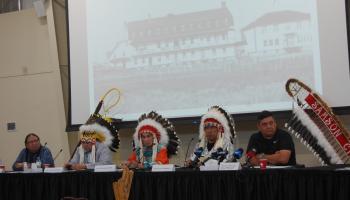Image Caption
Local Journalism Initiative Reporter
Windspeaker.com
Pope Francis will be in Maskwacis for no more than one hour on July 25, but the repercussions are already being felt and will continue to be felt long after.
“We’re trying to assess it right now,” said Ermineskin Chief Randy Ermineskin.
As the pre-planning stage begins, memories and feelings have been triggered in residential school survivors, he said.
“He will apologize and then he leaves and we’re left holding the bag,” said Ermineskin of the pope. “There will be much work to be done after.”
He said talks are ongoing with Health Canada and First Nations and Inuit Health Branch. He said local mental health workers were also being engaged.
Ermineskin also pointed out that the event will be virtual, which means that health support workers would be needed in places other than Maskwacis.
“It will open wounds again,” he said.
However, he added, there are many survivors who are “grateful,” himself included, for the Pope’s upcoming visit.
Ermineskin was joined by chiefs from Samson Cree Nation and the Louis Bull Tribe, and a councillor from Montana First Nation, as well as International Chief Wilton Littlechild today to discuss the upcoming papal visit.
The four First Nations form Maskwacis.
It was announced last week that the only residential school the Pope will visit is the former school in Ermineskin. It was one of the largest to operate in Canada, drawing in children from Treaty 6, 7 and 8 in Alberta, as well as parts of British Columbia and Saskatchewan.
Littlechild has worked tirelessly over the past seven years to have the Pope deliver on Call 58 of the 94 Calls to Action itemized in the final report from the Truth and Reconciliation Commission (TRC) on the legacy of residential schools. Littlechild was a commissioner on the TRC.
Call 58 states, “We call upon the Pope to issue an apology to Survivors, their families, and communities for the Roman Catholic Church’s role in the spiritual, cultural, emotional, physical, and sexual abuse of First Nations, Inuit, and Métis children in Catholic-run residential schools. We call for that apology to be similar to the 2010 apology issued to Irish victims of abuse and to occur within one year of the issuing of this Report and to be delivered by the Pope in Canada.”
The TRC met for six years, travelling across Canada and hearing stories from more than 7,000 survivors and descendants.
Despite his hard work and hands-on commitment to fulfilling Call 58, Littlechild said he was surprised that Maskwacis was on the Pope’s less than-a-dozen stops in his six days in Canada.
Littlechild attended the Ermineskin Residential School for 11 years.
Littlechild said he sees the Pope’s visit as a “very important occasion” as it provides an opportunity for forgiveness from survivors and their families. He said the opportunity to forgive has been one of the steps missing on the journey from truth to reconciliation.
Last week, Edmonton Archbishop Richard Smith, who also serves as the national coordinator for the Pope’s visit, said the visit to the Ermineskin residential school had to be both local and national in nature. He also said it was anticipated that the Pope’s “principle statement” would take place in Maskwacis.
While survivors spending time with Pope Francis is the priority, Littlechild admitted that the Pope’s ailing health limits the amount of time he can spend at a site.
That lack of time, said Ermineskin, has survivors disappointed after the “years and years” of trauma they endured at residential schools.
Littlechild said at this point the “best guestimate” is 15,000 survivors from coast-to-coast-to-coast making the trip to Maskwacis. Logistics are still being worked out.
While the National Indian Residential School Circle of Survivors is drafting an apology and words they would like to see the Pope use, Littlechild said his “humble request” to Pope Francis would be to endorse the 10 principles put forward by the TRC.
Among those principles are that the perspectives and understandings of Aboriginal Elders and traditional knowledge leepers of the ethics, concepts, and practices of reconciliation are vital to long-term reconciliation; and supporting Aboriginal peoples’ cultural revitalization and integrating Indigenous knowledge systems, oral histories, laws, protocols, and connections to the land into the reconciliation process are essential.
Ermineskin said there is discussion about having a welcoming delegation at the airport for the Pope’s arrival in Edmonton on July 24. Among those who would attend, he said, would be dancers “the age of children who were taken away” to provide the Pope with “a visual.”
While in Alberta, the papal visit will consist of a trip to the Sacred Heart Church of the First Peoples and celebrating an open-air Mass at Commonwealth Stadium, both sites in Edmonton. The Pope will also visit Lac Ste. Anne during the annual pilgrimage.
From Edmonton he flies to Quebec for two days. He ends his trip in Iqaluit before flying back to Rome July 29.
Local Journalism Initiative Reporters are supported by a financial contribution made by the Government of Canada.

